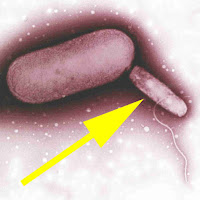 |
| Bdellovibrio bacteriovorus attacking prey bacterium |
Download Episode (7.3 MB, 7.9 minutes)
Show notes:
News item
Journal Paper:
Lambert C, Cadby IT, Till R, Bui NK, Lerner TR, Hughes WS, Lee DJ, Alderwick LJ, Vollmer W, Sockett RE, Lovering AL. 2015. Ankyrin-mediated self-protection during cell invasion by the bacterial predator Bdellovibrio bacteriovorus. Nat Commun 6:8884.
Other interesting stories:
Post questions or comments here or email to bacteriofiles@gmail.com. Thanks for listening!





